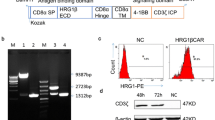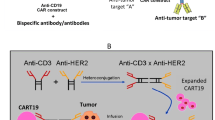Abstract
Objective
Although the development of trastuzumab has improved the outlook for women with human epidermal growth factor receptor 2 (HER2)-positive breast cancer, the resistance to anti-HER2 therapy is a growing clinical dilemma. We aim to determine whether HER2-specific T cells generated from dendritic cells (DCs) modified with HER2 gene could effectively kill the HER2-positive breast cancer cells, especially the trastuzumab-resistant cells.
Methods
The peripheral blood mononuclear cells (PBMCs) from healthy donors, whose HLA haplotypes were compatible with the tumor cell lines, were transfected with reconstructive human adeno-association virus (rhAAV/HER2) to obtain the specific killing activities of T cells, and were evaluated by lactate dehydrogenase (LDH) releasing assay.
Results
Trastuzumab produced a significant inhibiting effect on SK-BR-3, the IC50 was 100ng /ml. MDA-MB-453 was resistant to trastuzumab even at a concentration of 10,000 ng/ml in vitro. HER2-specific T lymphocytes killed effectively SK-BR-3 [(69.86±13.41)%] and MDA-MB-453 [(78.36±10.68)%] at 40:1 (effector:target ratio, E:T), but had no significant cytotoxicity against HER2-negative breast cancer cell lines MDA-MB-231 or MCF-7 (less than 10%).
Conclusion
The study showed that HER2-specific T lymphocytes generated from DCs modified by rhAAV/HER2 could kill HER2-positive breast cancer cell lines in a HER2-dependent manner, and result in significantly high inhibition rates on the intrinsic trastuzumab-resistant cell line MDA-MB-453 and the tastuzumab-sensitive cell line SK-BR-3. These results imply that this immunotherapy might be a potential treatment to HER2-positive breast cancer.
Similar content being viewed by others
References
Jemal A, Bray F, Center MM, et al. Global cancer statistics. CA Cancer J Clin 2011;61:69–90.
Slamon DJ, Clark GM, Wong SG, et al. Human breast cancer: correlation of relapse and survival with amplification of the HER2/neu oncogene. Science 1987;235:177–182.
Slamon DJ, Godolphin W, Jones LA, et al. Studies of the HER2/neu proto-oncogene in human breast and ovarian cancer. Science 1989;244:707–712.
Perou CM, Sorlie T, Eisen MB, et al. Molecular portraits of human breast tumours. Nature 2000;406:747–752.
Hynes NE, Lane HA. ERBB receptors and cancer: the complexity of targeted inhibitors. Nat Rev Cancer 2005;5:341–354.
Kim R, Tanabe K, Uchida Y, et al. The role of HER2 oncoprotein in drug-sensitivity in breast cancer (review). Oncol Rep 2002;9:3–9.
Dowsett M. Overexpression of HER2 as a resistance mechanism to hormonal therapy for breast cancer. Endocr Relat Cancer 2001;8:191–195.
Harbeck N. Breast cancer: Increasing therapy options for HER2-positive early breast cancer. Nat Rev Clin Oncol 2011;9:10–12.
Mukohara T. Mechanisms of resistance to anti-human epidermal growth factor receptor 2 agents in breast cancer. Cancer Sci 2010;102:1–8.
Jones KL, Buzdar AU. Evolving novel anti-HER2 strategies. Lancet Oncol 2009;10:1179–1187.
Peoples GE, Goedegebuure PS, Smith R, et al. Breast and ovarian cancer-specific cytotoxic T lymphocytes recognize the same HER2/neu-derived peptide. Proc Natl Acad Sci USA 1995;92:432–436.
Ladjemi MZ, Jacot W, Chardèt T et al. Anti-HER2 vaccines: new prospects for breast cancer therapy. Cancer Immunol Immunother 2010;59:1295–1312.
Melief CJ. Cancer immunotherapy by dendritic cells. Immunity 2008;29:372–383.
Ribas A. Genetically modified dendritic cells for cancer immunotherapy. Curr Gene Ther 2005;5:619–628.
Daya S, Berns KI. Gene therapy using adeno-associated virus vectors. Clin Microbiol Rev 2008;21:583–593.
Yu Y, Pilgrim P, Zhou W, et al. rAAV/HER2/neu loading of dendritic cells for a potent cellular-mediated MHC class I restricted immune response against ovarian cancer. Viral Immunol 2008;21:435–442.
Mahadevan M, Liu Y, You C, et al. Generation of robust cytotoxic T lymphocytes against prostate specific antigen by transduction of dendritic cells using protein and recombinant adeno-associated virus. Cancer Immunol Immunother 2007;56:1615–1624.
Wolff AC, Hammond ME, Schwartz JN, et al. American Society of Clinical Oncology/College of American Pathologists guideline recommendations for human epidermal growth factor receptor 2 testing in breast cancer. J Clin Oncol 2007;25:118–145.
Charafe-Jauffret E, Ginestier C, Iovino F, et al. Breast cancer cell lines contain functional cancer stem cells with metastatic capacity and a distinct molecular signature. Cancer Res 2009;69:1302–1313.
Korkaya H, Paulson A, Iovino F, et al. HER2 regulates the mammary stem/progenitor cell population driving tumorigenesis and invasion. Oncogene 2008;27:6120–6130.
Nahta R, Esteva FJ. In vitro effects of trastuzumab and vinorelbine in trastuzumab-resistant breast cancer cells. Cancer Chemother Pharmacol 2004;53:186–190.
Bedard PL, Cardoso F, Piccart-Gebhart MJ. Stemming resistance to HER2 targeted therapy. J Mammary Gland Biol Neoplasia 2009;14:55–66.
Koninki K, Barok M, Tanner M, et al., Multiple molecular mechanisms underlying trastuzumab and lapatinib resistance in JIMT-1 breast cancer cells. Cancer Lett 2010;294:211–219.
Ahmed N, Salsman VS, Kew Y, et al. HER2-specific T cells target primary glioblastoma stem cells and induce regression of autologous experimental tumors. Clin Cancer Res 2010;16:474–485.
Sykulev Y, Joo M, Vturina I, et al. Evidence that a single peptide-MHC complex on a target cell can elicit a cytolytic T cell response. Immunity 1996;4:565–571.
Unanue ER, Harding CV, Luescher IF, et al. Antigen-binding function of class II MHC molecules. Cold Spring Harb Symp Quant Biol 1989;54Pt 1:383–392.
Inokuma M, dela Rosa C, Schmitt C, et al. Functional T cell responses to tumor antigens in breast cancer patients have a distinct phenotype and cytokine signature. J Immunol 2007;179:2627–2633.
Pinzon-Charry A, Maxwell T, McGuckin MA, et al. Spontaneous apoptosis of blood dendritic cells in patients with breast cancer. Breast Cancer Res 2006;8:R5.
Zhang Y, Ma B, Zhou Y, et al. Dendritic cells fused with allogeneic breast cancer cell line induce tumor antigen-specific CTL responses against autologous breast cancer cells. Breast Cancer Res Treat 2007;105:277–286.
Gabrilovich DI, Corak J, Ciernik IE, et al. Decreased antigen presentation by dendritic cells in patients with breast cancer. Clin Cancer Res 1997;3:483–490.
Lespagnard L, Gancberg D, Rouas G, et al. Tumor-infiltrating dendritic cells in adenocarcinomas of the breast: a study of 143 neoplasms with a correlation to usual prognostic factors and to clinical outcome. Int J Cancer 1999;84:309–314.
Author information
Authors and Affiliations
Corresponding author
Additional information
This work was supported by the grant from the National “973” Basic Research Program of China (No.2009CB521703) and Medical Oncology Leadership of Beijing Municipal Government Health Burean (No. 2009-2-16).
Rights and permissions
About this article
Cite this article
Lin, Xl., Wang, Xl., Ma, B. et al. HER2-specific T lymphocytes kill both trastuzumab-resistant and trastuzumab-sensitive breast cell lines in vitro . Chin. J. Cancer Res. 24, 143–150 (2012). https://doi.org/10.1007/s11670-012-0143-6
Received:
Accepted:
Published:
Issue Date:
DOI: https://doi.org/10.1007/s11670-012-0143-6




